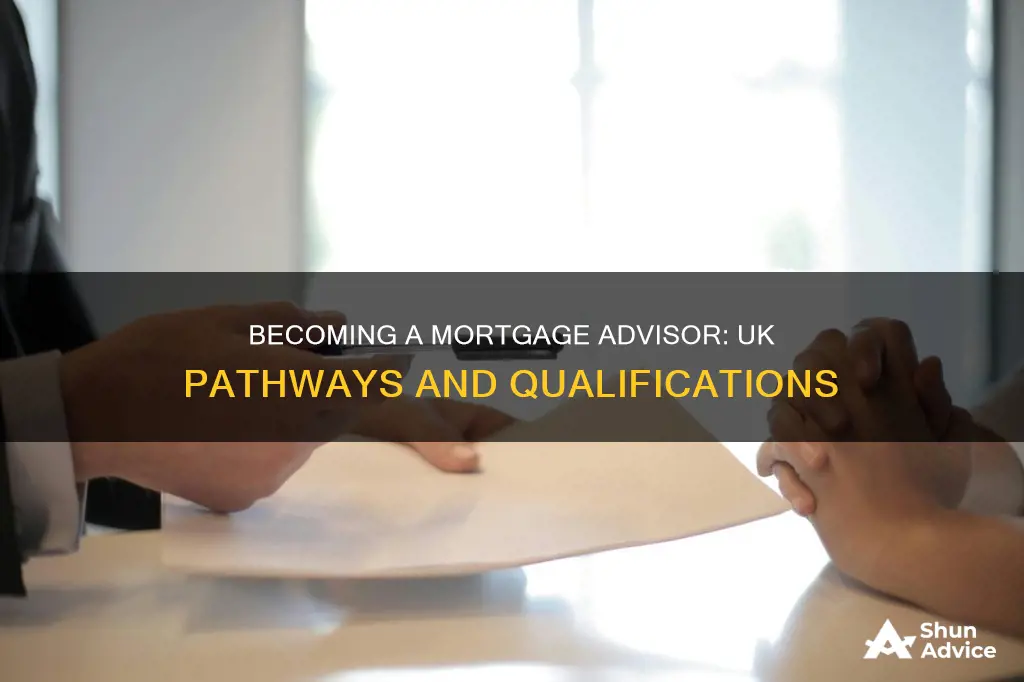
If you're interested in a career as a mortgage advisor in the UK, you'll need a mix of qualifications, experience, and a strong professional network. The role involves guiding clients through the complex world of mortgages, helping them secure the best deal for their dream home. While a degree is not mandatory, certain qualifications are required, such as the Certificate in Mortgage Advice and Practice (CeMAP), recognised by the Financial Conduct Authority (FCA) and awarded by the London Institute of Banking and Finance. Apprenticeships, training schemes, and entry-level positions are also available for those eager to start their journey towards becoming a successful mortgage advisor.
| Characteristics | Values |
|---|---|
| Qualifications | Level 3 CeMAP qualification, also known as the Certificate in Mortgage Advice and Practice. |
| Diploma for Financial Advisers (DipFA) | |
| CertPro | |
| Level 4 Certificate in Mortgage Advice | |
| Level 6 qualified financial adviser | |
| Statement of Professional Standing (SPS) | |
| GCSEs at grades 9 to 4 (A* to C), or equivalent, including English and maths | |
| Career path | College course |
| Advanced apprenticeship | |
| Work your way up from a customer service adviser role in a bank or building society, or as a mortgage administrator in a firm of brokers | |
| Apply for a mortgage adviser training scheme run by banks and building societies | |
| Transition from a role in finance or sales | |
| Salary | £36,398 per year |
| £50,490 per year in Glasgow, Scotland | |
| Work location | Contact centre, office, client's home or client's business |
| Every area throughout the UK |
What You'll Learn
- Qualifications: Level 3 CeMAP, also known as the Certificate in Mortgage Advice and Practice
- Career progression: Start as a customer adviser and work your way up
- Apprenticeships: Take up an advanced apprenticeship to gain experience and qualifications
- Memberships: Join a professional body like the Chartered Insurance Institute for access to knowledge and networking
- Self-employment: Set up your own firm of independent advisers

Qualifications: Level 3 CeMAP, also known as the Certificate in Mortgage Advice and Practice
To become a mortgage advisor in the UK, it is essential to obtain the Level 3 CeMAP qualification, also known as the Certificate in Mortgage Advice and Practice. This qualification is widely recognised as the industry standard for mortgage advisers and is approved by the Financial Conduct Authority (FCA). The course covers the core aspects of the mortgage market, laws and regulations, providing a practical approach to study. It consists of three papers and can be studied independently or through an external training provider, with many course providers offering flexible arrangements such as distance learning. The assessment modules and exams typically take between six months to two years to complete.
The CeMAP qualification is perfect for those with no prior experience in the financial services sector, as it provides a comprehensive understanding of the mortgage market and the role of a mortgage advisor. It is designed to equip individuals with the knowledge and skills needed to guide clients through the complex process of obtaining a mortgage, empowering them to make informed decisions and secure the best mortgage terms for their unique financial situations.
The Certificate in Mortgage Advice and Practice covers a range of topics, including the regulation and ethics of the industry, financial services, and mortgage advice. It is created in association with relevant professional bodies, such as the Financial Intermediary and Broker Association (FIBA) and the Bridging and Development Lenders Association (BDLA). This ensures that the qualification remains up-to-date and relevant to the dynamic nature of the mortgage industry.
Upon successful completion of the CeMAP qualification, individuals can apply for their licence to practise as a regulated mortgage adviser. This opens up career opportunities with large financial institutions, independent mortgage brokerages, or even the option to become a self-employed, independent mortgage advisor. Obtaining the CeMAP qualification can be a rewarding step towards a career in the mortgage industry, providing individuals with the necessary skills and knowledge to guide clients effectively through their financial journeys.
USDA Mortgage: Application Process Simplified
You may want to see also

Career progression: Start as a customer adviser and work your way up
If you're looking to start as a customer adviser and work your way up to becoming a mortgage adviser, there are a few things you can do to set yourself on the right path.
Firstly, gaining experience in customer service, especially in a bank or financial institution, can be a great starting point. This will allow you to develop essential skills in customer interaction and build a strong understanding of the financial sector. You could also consider becoming a mortgage administrator in a firm of brokers, which would provide valuable insights into the mortgage industry.
As you gain experience in these roles, you can start exploring opportunities to transition into mortgage advisory. This could involve applying for mortgage adviser training schemes offered by banks and building societies or pursuing apprenticeships that specialise in mortgage advice. These apprenticeships typically require five GCSEs, including mathematics and English, and they offer a mix of on-the-job training and academic study over the course of about 12 months.
Once you've established a solid foundation in customer service and gained some exposure to the financial industry, you can begin working towards obtaining the necessary qualifications to become a certified mortgage adviser. The Level 3 CeMAP qualification, also known as the Certificate in Mortgage Advice and Practice, is widely recognised as the industry standard. This certification can be obtained through various study options, including classroom-based learning, webinars, or self-paced e-learning, and typically takes between six months to two years to complete.
After achieving your CeMAP qualification, you can further enhance your career prospects by pursuing additional certifications, such as the Diploma for Financial Advisers (DipFA), which is recognised by the Financial Conduct Authority (FCA). Obtaining this qualification will enable you to work as a financial adviser and provide a broader range of financial services to your clients.
With experience and continued professional development, you'll have the opportunity to advance even further in your career. You could become a self-employed independent mortgage adviser, managing your own caseload of clients, or progress into senior management roles, leading a team of mortgage advisers. Additionally, you could explore specialisations such as becoming an Equity Release specialist (CeRER) or expanding your expertise to advise on commercial lending, buy-to-let properties, and more.
Remember, building a solid network within the industry, seeking mentorship opportunities, and maintaining a strong commitment to continuous learning will greatly benefit your career progression in the field of mortgage advisory.
Adding Your Adult Son to Your Mortgage: What You Need to Know
You may want to see also

Apprenticeships: Take up an advanced apprenticeship to gain experience and qualifications
If you're interested in becoming a mortgage advisor in the UK, you might want to consider taking up an advanced apprenticeship. This route will allow you to gain the necessary experience and qualifications while earning a salary.
The Level 3 Mortgage Adviser Apprenticeship is a comprehensive programme that covers mortgages and related protection products, such as life insurance or sickness and unemployment insurance. You will learn about financial services systems and processes and develop an understanding of the legal and regulatory frameworks that govern the industry. This apprenticeship also focuses on strengthening customer service skills, such as listening, communication, problem-solving, resilience, and relationship-building.
To be eligible for this apprenticeship, you will typically need a minimum of 5 GCSEs at grades 9 to 4 (A* to C), including English and maths. Some providers may have additional requirements, so it's important to check with the specific apprenticeship programme you're interested in.
The duration of the apprenticeship is usually around 12 months, and upon completion, you will be awarded the Certificate in Mortgage Advice and Practice (CeMAP). This qualification is widely recognised in the industry and is endorsed by the Financial Conduct Authority (FCA).
If you're interested in finding apprenticeship vacancies, you can use resources such as the Find an Apprenticeship service, which can alert you when new opportunities become available and provide advice on how to apply.
Adding Your Daughter to Your Mortgage: What You Need to Know
You may want to see also

Memberships: Join a professional body like the Chartered Insurance Institute for access to knowledge and networking
Joining a professional body such as the Chartered Insurance Institute (CII) is a great way to access knowledge and networking opportunities. The CII is a professional body dedicated to building public trust in the insurance and financial planning profession. It offers insurance and personal finance qualifications catering to all levels of knowledge and experience, from newcomers to seasoned professionals.
The CII's qualifications can help you develop a strong understanding of the mortgage sector and the mortgage process, enabling you to meet individual client needs. This means you will not only meet the qualification requirements to provide mortgage advice but also gain the skills to support your clients' and employers' objectives.
The CII's Certificate in Mortgage Advice, for example, is the benchmark qualification for mortgage advisers. It meets the FCA's qualification requirements and is recognised as the standard qualification for mortgage advisers. The course typically takes six months to two years to complete and can be studied independently or through an external training provider.
Membership in the CII provides access to technical and market knowledge, a range of training and networking opportunities, and practical support for your continuous professional development (CPD). It also enhances your career potential by showcasing your credibility and commitment to the industry.
The CII is located at 20 Fenchurch Street, London, and can be contacted via phone or email during business hours.
Steps to Applying for a Mortgage: A Guide
You may want to see also

Self-employment: Set up your own firm of independent advisers
Setting up your own firm of independent mortgage advisers in the UK is a viable career path, especially if you have the right qualifications and product knowledge. Here are some key considerations and steps to help you get started:
Qualifications and Experience:
Firstly, ensure that you have the necessary qualifications and experience to provide mortgage advice. The Level 3 CeMAP qualification, or Certificate in Mortgage Advice and Practice, is widely recognised as the standard qualification for mortgage advisers. This qualification can be obtained through independent study, with employer support, or through external training providers, offering flexible arrangements such as distance learning. Obtaining this certification will provide you with the foundational knowledge to advise clients on mortgage products and services.
Regulatory Compliance:
To operate as an independent mortgage adviser, you must ensure regulatory compliance. This includes obtaining the Competent Advisor Status (CAS) to manage your own cases and provide advice directly to clients. Additionally, consider joining a professional body such as the Chartered Insurance Institute (CII) to enhance your credibility and access technical and market knowledge, training opportunities, and networking events.
Business Setup and Operations:
Establishing your firm will involve registering your business, setting up the necessary infrastructure, and defining your business model. Consider the scope of services you will offer and whether you will specialise in a particular area of mortgage advice. Develop a comprehensive understanding of the mortgage market, including the range of mortgage products and services available, to ensure you can provide valuable insights to your clients.
Sales and Marketing:
As an independent firm, attracting new business will be essential. Develop a robust marketing strategy to promote your services and establish relationships with potential clients. Networking within the industry and building a solid online presence can also help to enhance your firm's reputation and visibility.
Building a Team:
As your business grows, you may consider expanding your team of independent advisers. This will involve recruiting and training additional advisers, providing them with the necessary support and resources to succeed. As the head of your firm, you will be responsible for overseeing the work of your team and ensuring that the advice provided meets industry standards and regulatory requirements.
By following these steps and maintaining a strong work ethic, you can establish and grow your own firm of independent mortgage advisers, offering valuable guidance to clients navigating the complex process of obtaining a mortgage.
Assuming Deceased Husband's Mortgage: Florida's Legal Process
You may want to see also
Frequently asked questions
The most common and essential qualification is the CeMAP qualification, or Certificate in Mortgage Advice and Practice. This is a Level 3 course approved by the Financial Conduct Authority (FCA) and is viewed as the industry standard.
No, you do not need a degree to become a mortgage advisor. However, certain degrees can provide a solid foundation for your career. These include degrees in real estate, finance, business, and accountancy.
Strong math and analytical skills are essential for a career in mortgage advising. You will also need excellent communication skills, both written and oral, and the ability to work independently. Confidence, determination, and good listening skills are also important.
The salary of a mortgage advisor in the UK can vary depending on experience, location, and the number of clients. A new mortgage advisor can expect to earn around £20,000-£25,000 per year, while experienced advisors can earn up to £70,000 per year.
Mortgage advisors in the UK typically work regular office hours, such as 9-5, Monday to Friday. However, they may need to work outside of these hours to meet with clients in the evenings or on weekends. The working environment can vary, with some advisors working in an office, from home, or visiting clients at their homes.







